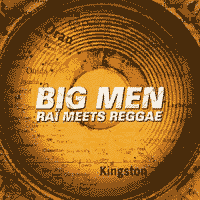
VAROUS ARTISTS
BIG MEN: RAI MEETS REGGAE (Beatville)
There was quite a buzz among my deejay pals about the new Rai meets Reggae CD, BIG MEN. At first I was skeptical because, when pressed, all they would admit was the first track was a groove. As deejays regularly buy a CD for one hit track I wasn't sure the idea of Dancehall + Rai would be worth a whole hour of time, or even get past the novelty stage. But the fact is: this works, for the most part. There are some stalwarts of the reggae scene here, like Leroy Sibbles and Greg Isaacs, singers who have become truly legendary in the third world. The Arabic dance grooves come courtesy of Lamine, Fadela, Khaled, Tarik, and a roster of top Rai artists.
The first track is indeed a gem: "A hundred percent a' love" by Kouider with the toast by Kentucky Kid. There's a French brass section and synth, but derbouk and gasba also riding atop Sly 'n' Robbie. This one is too short at 5 minutes. Next up a cover of John Holt's "A Love I can feel" has Rai lyrics by Tarik over Sly 'n' Robbie's arrangement.
Horace Andy's "Positive" takes a different approach, incorporating a sample of Aissa Jermouni el Harkati from 1928. It's out of this world. (The album is "livicated" to her and King Tubby.) Thanks to his rediscovery by Massive Attack, Andy sounds perfectly at home in the eerie fog of Martin Meissonnier's synth.
Equally, U Roy seems perfectly suited to the give-and-take exchange with Larbi Dida, but his part is marred by the use of vocoder and very dated whiny synth fills. After a flat middle part things perk up with the husky voice of Greg Isaacs on "I'll be the one." The mellow addition of Miana fits right in as the tune coasts off on waves of bliss. The title cut, by Sugar Minott, sounds like Rick James and is a bit of a dinosaur rocker. I'm not a true "asphyxianado" of dancehall as I get tired of the sexist sentiments in the lyrics and monotony of some of the grooves. Here the Rai helps but a little of the mixture goes a long way. The album ends with a remix of the first cut, which is indeed the best thing on the album. If you think of it as a 12" single with a couple of bonus tracks, then it's worthwhile.
As reggae becomes a common currency from Brasil to Burkina Faso, we can expect more hybrid sounds like this and further cultural enrichment on all sides.
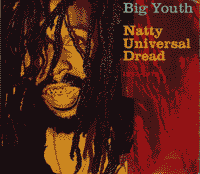
BIG YOUTH
NATTY UNIVERSAL DREAD 1973-79 (Blood & Fire BAFCD034)
Alongside Gregory Isaacs stand his little brother, the late Dennis Brown (who died in 1999 leaving something like 30 children), and Big Youth as the champions of the downtrodden, the stars of the ghetto (who can also be heard in the favelas of Salvador da Bahia and Rio). Big Youth is a strangely compelling reggae superstar. If you were to describe someone with not much of a voice chanting nursery rhyme-like slogans over a minimal rhythm I'd think you were talking about bad rap. Add a schizophrenic-like dialogue between half-sung half-toasted (!) voices and screeches and yelps of punctuation competing to be heard edgewise and you have a unique musical phenomenon.
Blood & Fire's release of the Big Youth box NATTY UNIVERSAL DREAD 1973-79 is now out with the manufacturing flaw corrected (the plastic nipple that holds the CD in the cardboard slipcase was originally made of styrofoam). The three CDs cover a productive period of this singer's career. After a few successful singles, he realized he could take the basic talking-back formula of U-Roy and add Rastafarian lyrics. He soon held the top three slots in the record charts and at one point had SEVEN of the top twenty singles to his credit. Producers flocked to him for versions (the Abyssinians' "Satta Amassa Gana" and Burning Spear's "Marcus Garvey" are both included here -- at least in the defective set which was recalled), but he also chose his own material, sticking with remakes of classics like the Paragon's "Only a Smile" or Carlton & His Shoes "Love is All." It helped that he could call on the Heptones and Gregory Isaacs to sing back-up.
Noel Hawks points out the sources of toasting (& ultimately rap), in Dave Bartholomew's "The monkey speaks his mind," Harlem radio DJs like Dan Burley, and the early Jamaican MCs like Sir Lord Comic & Count Machuki. Big Youth's influences are many but notably the Last Poets' lyrics crop up frequently in his toasts ("John Coltrane died in vain" is Youth's famous refrain from "Jim Screechy."). From Trinidad he appropriates Lord Melody's "Booboo Man." His style is accretive. His repetition of "As I would say" or "Ah so we say" is a little mnemonic device he uses to buy time while thinking of what comes next. Repetition also extends to the rhythms which are stripped down to the bare bones (mostly recut for the occasion). But these are well-known enough that you find yourself hearing Dennis Brown's "Money in my pocket," or whatever the original tune is, so that melodic part of the music is resolved in your brain.
The diversity of his sources is what is amazing about Big Youth, and he always has a new trick up his sleeve. The third album in the set, "Hotter Fire," contains "Proud Mary" (with bits of "Old Man River"), The Archies' "Sugar Sugar" and Percy Mayfield's "Hit the Road, Jack." His version of the Ray Charles classic bears no resemblance to the original. First the rhythm is Carlton Manning's "Love me Forever," then the lyrics veer off into Burt Bacharach's "What the world needs now is love." It is as silly as it sounds and shows him free-associating wildly: "My mama got stickin, when my daddy start lickin: guess she's going out with the funky chicken."
The three CDs in this set give a very idiosyncratic take on popular Jamaican culture throughout the 1970s. The fact that it doesn't wear thin (compared e.g. to the recent Hendrix box set) is a testament to the strength and originality of the always entertaining Manley Buchanan, aka Big Youth.
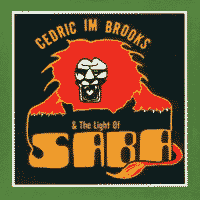
CEDRIC IM BROOKS & THE LIGHT OF SABA
THE MAGICAL LIGHT OF SABA (Honest Jons Records HJRCD4)
Cedric 'Im Brooks is one of the lesser-known elders of Jamaican music who came out of the Alpha Boys School. Brooks grew up around Baba Brooks and studied jazz clarinet at Alpha, graduating to alto sax. He teamed up with guitarist Keith Gordon and later Deadley Headley. He wrote transcriptions for cover bands and gigged around the Caribbean in the 60s playing lounge jazz. In 1968 he moved to Philadelphia, being inspired by Sonny Rollins and Sun Ra. Back in Jamaica a few years later he began to explore Ethiopian culture and invited Count Ossie and his drummers to sit in with his band, the Mystic Revelation of Rastafari, which eventually became the Divine Light. They studied with Olatunji, Melba Liston, Hugh Masakela, and other important figures in the spread of African music. The large group has stayed true to their inspiration, which is the African roots of Jamaican music, and survived despite their lack of commercial success. They include Brooks on tenor and alto, Bubbles and Nambo on trombones, and Dean Frazer on trumpet. The material ranges from deep rootical drumming tracks like "Rasta lead on version" to folk songs like "Nobody's business but me own" and "Sly mongoose," which are done mento-style. Covers include Abyssinians' "Satta massagana" and Horace Silver's "Song for my father." You can hear the influence of Coltrane in "Sabasi." It's an eclectic, mostly instrumental set that is smooth, diverse, interesting and well-recorded. The collaborative composition "Rebirth" has a nicely orchestrated horn chorus including flute over nyabinghi drumming. The bass only maxxes out on the last track, "Collie version," which is a well-crafted coasting instrumental with minimum effects like space echo. One could envisage a whole dub side to this satisfying excursion.
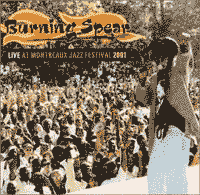
BURNING SPEAR
LIVE AT MONTREUX JAZZ FESTIVAL 2001 (Nocturne NTCD 113 2002)
A Few years ago I saw Burning Spear on a British television show and the host was being very solicitous. Tell me, Mr Spear, he enquired, Is it true you taught Bob Marley how to sing?
Me know Bob inna de yard, replied the Spear stoically. We vocalize sometime then. And we talk about roots and culture ... and t'ings.
What sort of things? -- the next breathless question.
Rootical t'ings! -- the enigmatic reply.
Well there are plenty of rootical tings to ponder on the new album BURNING SPEAR LIVE AT MONTREUX JAZZ FESTIVAL 2001. Spear has been touring for decades and if he doesn't improve he's at least consistent and that's something in the world of sliding values and diminishing returns. In fact he sounds damned good in light of all the reggae that came along since his MAN IN THE HILLS days. The band stretches out but also reins in the ends of songs to twist the gears into the next tune. They are polished and the three-piece horn section adds depth and enough jazz to make their appearance at Montreux credible.
From the haunting "Jah nuh dead" and "Slavery Days" to "Man in the Hills," "Tumble Down," and "Rocking Time," he covers all his classic songs. "Man in the Hills" and "Tumble down" both get a long jazz treatment with individual solos from Micah Robinson on trombone, Clyde Cummings on sax, and James Smith on trumpet. The final number, "Happy Day" is furthest out in terms of the jazzy soloing, till Spear goes into his parting benediction. The album is nothing too astounding but it's seventy minutes of pleasant level vibes.
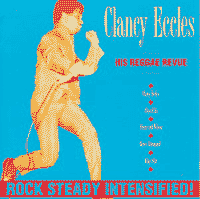
CLANCY ECCLES PRESENTS HIS REGGAE REVIEW
ROCKSTEADY INTENSIFIED! (Heartbeat HB71)
Heartbeat have been chasing after Trojan's Steve Barrow for some time, trying to second guess him, or just match him in their releases of late '60s Jamaican rocksteady and early '70s reggae. Trojan virtually redefined the history of Jamaican popular music and now other labels are filling in the gaps. Among the many compilation releases in 1990 (Derrick Harriott's RIDING THE MUSICAL CHARIOT and Niney's OBSERVER STATION are the most recent), this one finds a warm spot in my heart. Clancy Eccles organized stage shows called the Bandwagon which he used to back Michael Manley's electioneering, with considerable success. Helmsley Morris and Larry Marshall are among neglected artists who receive their due here, along with more familiar names like Alton Ellis and Joe Higgs. Ellis covers "Bye, Bye love," and a moody "Feeling Inside." The first track, "Stay Loose," by Helmsley Morris, is a killer: without multi-tracking he backs his soulful vocal with sketched-in falsetto harmonies, as if hearing a trio in his head, ghosting in the other parts for us in a unique kind of mental dub. His other track is a revelation too. Monty Morris's "My Lonely Days" has steel pan overdubs which are the only time I've heard this wonderful instrument in this context. Perhaps the fact that it is associated with tourism in the West Indies excluded it from the real music of the Jamaican people. (1990)
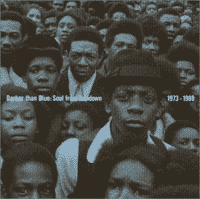
VARIOUS JAMAICANS
DARKER THAN BLUE: SOUL FROM JAMDOWN 1973-80 (Blood & Fire BAF CD036)
As I always travel light, I took only one CD with me on a fortnight's trip to the auld sod in 2000, and so I got a chance to listen to it several times: the Blood & Fire release DARKER THAN BLUE: SOUL FROM JAMDOWN 1973-80. It's a familiar set of songs but delightfully fresh because these Jamaican covers of American soul hits never got much airplay outside the Caribbean. The album includes funk as well as soul and R&B covers. War's "Slipping into darkness" gets a smooth cover from the obscure Carl Bradney. This will grab anyone into funk, or who grew up in the seventies. Like all classic reggae from this period it's laid back and lets the groove build. That's followed by a classic version of "Is it because I'm black" by Ken Boothe. Freddie McGregor does a rocking take of George Jackson's political plea "Get involved." Boothe also does Bill Withers' "Ain't no sunshine," which I found myself singing today although the weather has improved. From this parallel universe comes another take on Curtis Mayfield's classic "Gypsy woman." Though Derrick Morgan and the Mighty Diamonds also covered the Impressions' hit, this one, by Milton Henry, is deeply Yardie. Personally I prefer the version by Slim Smith and the Uniques because I know it so well, but Henry's ain't bad, though it fades out on the start of a great trombone solo.
Former Inspiration Jimmy London's "I'm your puppet" is another fresh take on an obscure pop-soul gem, later covered by Delroy Wilson. Wilson delivers the most familiar song on this collection, "Get Ready," a song covered by Alton Ellis but done to perfection here with a great dub outro. The title cut is magical, it's (also) Curtis Mayfield's "Darker than blue" sung in a quavery falsetto by Lloyd Charmers, backed by Third World before they signed to Island. The Tamlins complete the set with a Randy Newman song, "Baltimore" that was a club hit for Nina Simone in 1978. This version has Sly & Robbie backing in a slowed down Stax-Motown kind of beat with horns and a wicked piano. The last cut is a deejay toast over the same rhythm by Welton Irie which shows how much the Sugarhill Gang impacted dancehall music (He even cops lyrics from the Furious Five: "I don't mean to brag, I don't mean to boast," etc.). I would have preferred an instrumental dub to end with but this is another fine effort from Blood & Fire (with a beautiful booklet) and folks who dig the Curtis Mayfield tribute, or Motown-to-Trenchtown sets in general will snap this up.
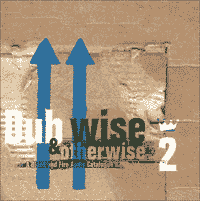
DUBWISE & OTHERWISE 2
A BLOOD & FIRE AUDIO CATALOGUE (Blood & Fire BAF CDS 905)
Blood & Fire occupy an important place in classic reggae. Trojan of UK ruled the roost for two decades, then, in the 80s, Heartbeat weighed in with choice releases from Studio One's vaults. Jamaican Gold from Portugal made important contributions along with smaller labels like Lagoon and Jet Set, but the most consistent label for quality reissues is Blood & Fire which is compiled and annotated by Steve Barrow (who started out at Trojan). In less than a decade they have reissued forty of the best sessions, lovingly restored and handsomely produced.
DUBWISE & OTHERWISE 2 is a sampler from the last 17 Blood & Fire releases. Plums on here include Impact All Stars' "Easy come Dub" from FORWARD THE BASS (Dub from Randy's 1972-5), Junior Byles' "Chant Down Babylon," from 129 BEAT STREET, Max Romeo's "Valley of Jehosaphat," from OPEN THE IRON GATE, Gregory Isaacs' "Slave Master," from MR ISAACS, and "Baltimore" by the Tamlins, from DARKER THAN BLUE, one of the most unusual and compelling covers of an American pop song (by Randy Newman) ever done by a Jamaican group. The album returns to the spiritual for the final cut, a 12 inch blend of "Jah is my light" by Leroy Smart coupled with I-Roy's "Wicked Eat Dirt," both done over the "Satta" rhythm for Niney the Observer and found on MICROPHONE ATTACK. DUBWISE & OTHERWISE is budget-priced to whet your appetite.
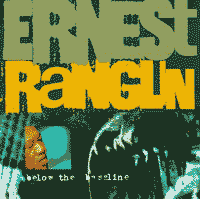
ERNEST RANGLIN
BELOW THE BASSLINE (Island Jamaica Jazz 314-524 299-2 1996)
Now that reggae has become a mainstream musical form it's fun to hear the classics being worked over by some top jazz musicians. Reggae guitar never had the manic intensity of its American or British pop counterpart anyway, but always sat more in the vein of Wes Montgomery or Les Paul. Significantly, Ranglin keeps in the background on this new album released under his name, and there's plenty of space in the simple melodies for everyone to stretch in solos. The lead duties are shared by the lyrical piano of Monty Alexander; but the most refreshing aspect of the session is the crisp approach to the rhythm provided by acoustic bassist Ira Coleman and drummer Idris Muhammad. Though the studio pyrotechnics of King Tubby and other Dub producers add great atmosphere to the originals, it's a pleasure to hear the music without the haze. The familiar standards include Ranglin's own "Surfin" and "Below the Bassline." His "Bourbon Street Skank" shows the influence of New Orleans R&B on Jamaican popular music. He includes sparkling takes on tunes by the Congos, Toots, the Abyssinians, Burning Spear, and the Skatalites. Rolando Alphonso plays sax on his own "Ball of Fire." A classic.
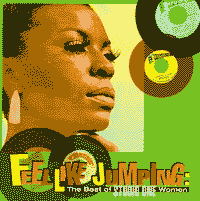
VARIOUS JAMAICAN WOMEN
FEEL LIKE JUMPING (Heartbeat)
There's a new (sort of) Studio One album on Heartbeat called FEEL LIKE JUMPING which features the women singers from that label. Female vocalists have always been a key part of the reggae sound and this isn't the first compilation devoted to the Jamaican songbirds but it certainly is exceptional. There's quite a few previously unreleased tracks on here as well as a few extended mixes of classic tracks. It kicks off with a sweet ballad: "Don't worry about me" by Nana McLean. The title track is a great rocksteady shuffle from 1968. Here Marcia Griffiths sings the original version without Roland Alphonso's overdubbed sax solo. There's a lively falsetto chorus and a gruff guy grunting in the background like a hippo. The lyrics are included in the booklet. In the case of this song, at least, that's a bit of a joke, though the grids of "la la la la la" make pleasant patterns on the page. This tune was also the basis for Toots & the Maytals' hit "54-46: That's my number." Then the first of the big bombers comes winging ominously over the scene: Dawn Penn's outrageously sultry "No, no, no." If you're at all prone to depression, skip this track, or you'll be in the bath with slit wrists before it's over -- it does drag you down faster than hearing Velvet Underground on codeine. Nevertheless it's a great song and was revamped as a disco hit a few years ago. (The liner notes ruefully state that after the Steelie and Clevie remix stormed the New York club scene, Heartbeat leased it to Atlantic but "the deal soured and it became another lost opportunity for reggae.") Other Dawn Penn tracks remain unreleased including the original version of "No, no, no" which was done as a ska number!
Denise Darlington's "Feel so Good" is another catchy rocksteady pop song. The backing track is very familiar, but the indispensable Studio One singles listing and rhythm directory (NEVER GROW OLD, 3rd edition, n.p., 1994), only mentions The Eternals' "Lost your date" as using the same track.
[Memo to Heartbeat: How about a "Versatiles meet the Eternals" compilation? And while you're at it, there must be an album's worth of Sir Lord Comic waiting to be rediscovered.]
Doreen Schaeffer's "Try a little smile" whisks us up to the late 70s with its characteristic Studio One extended dub boosting the bass and sampling the keyboard lead and horn chorus. Little Audrey's previously unreleased "Give me Sea Puss and Bammie" is a novelty number of sorts. Her voice is a little hard to get used to, but the song is a charming ditty about the tastes of a Jamaican gal -- a shy gal from the country who dressed simply, according to Coxsone Dodd. Not quite a Mento, the song is an example of what can only be called Reggae Country music. In case you're wondering, the song is about octopus and sweet potato flour dumplings.
In contrast, urban sophistication oozes from the grooves of "Bucktown Corner" by the Jay Tees, a couple of fly deejays. They gave up on their album because they were eclipsed by Althea and Donna, and this song does recall that duo's "Uptown Top Ranking." The lyrics tell you where to score the best ganja in Kingston. I'm sure it boosted Jah Lloydie's business enormously. It's a very provocative song, quite unlike the smooth ballad style of most of the album.
Jennifer Lara's "Consider me," reworks the "I don't know why" rhythm of Delroy Wilson. She paraphrases Bob Marley: "Long time I say / We no have no nice time / Four hundred years / Has been such a long time." Myrna Hague's "What about me," is a lament from a spurned lover whose boyfriend didn't invite her to his wedding. It seems the majority of rocksteady ballads are about lost love. (A friend asked me to put together a rocksteady tape for his wedding, but I couldn't find enough happy love songs and in the end put together a compilation of African songs about taxi drivers -- his occupation at the time.)
Now we come to the main reason to own this CD: the previously unreleased extended mix of Norma Fraser singing "The First cut is the deepest." I'm sorry to say this song was written by Cat Stevens about whom the less said the better. Fraser's version is modeled after the hit single recorded by P.P. Arnold (backed by the Nice) with, of course, a rocksteady lilt. The version is a monster, and requires a lot of wattage to achieve the full effect. In fact, if you haven't bled to death yet in the bath, the bridge into the version is the point at which you'll want to knock the stereo into the tub and go out in a flash! Not that this should be music to croak by: it's just highly charged emotionally. The new mix was done last year by Chris Wilson of Heartbeat. I guess he found more than one take on the master tapes and decided to try his hand at editing them together and remixing them. It works really well.
Jerry Jones, an American singer, vocalizes Les McCann & Eddy Harris's hit "Compared to what?" The band manages a great spare R&B sound which is more Stax than jazz.
Once again Heartbeat has done Studio One proud by taking another chunk of its legacy and making it new. Though many of the tracks are familiar, having them lined up this way to emphasize the wonderful talented women vocalists of Studio One is a pleasure to hear. (And see this!)
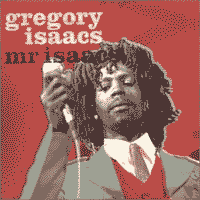
GREGORY ISAACS
MR ISAACS (Blood & Fire BAF CD035)
Blood & Fire has reissued Gregory Isaacs' landmark fourth album, MR ISAACS from the mid-seventies. After absorbing the influences of crooners John Holt and Alton Ellis (and through them, Smokey Robinson, Sam Cooke and other continental counterparts) and perfecting their style of the pillow-eyed lover, Isaacs re-emerged as ghetto spokesman in 1976 with the Lee Perry produced hit "Mr Cop." This new direction propelled him to the front rank of conscious entertainers on the island as he balanced Babylon with the bedroom. In the next decade Isaacs emerged internationally as one of the best performers to come out of Jamaica. His appearance at Keystone, Berkeley, in 1984, backed by the incredible Roots Radics (who dubbed live on stage) confirmed the praise heaped on him (at the time his NIGHT NURSE album was a huge hit). I was blown away by the show, but together enough to (surreptitiously) record the set which covered all his dozen hits.
An encounter with the police cost Isaacs his dreadlocks (which actually allowed him to refashion his image) but, more serious than police beatings and four jail terms for possession, his reputed marching powder habit damaged his teeth and ruined his voice.
Blood & Fire gives value for money and have added an extended mix of "Mr Brown" (a single from the same session that was not on the album), a cover of Slim Smith's "Conversation," and both sides of the "Mr Know it all" single with Sly Dunbar, from 1978. "Take a Dip" is augmented with a rare toast by Dillinger, whom Steve Barrow rightly describes as "rumbustious."
Produced by Ossie Hibbert, MR ISAACS is beautifully constructed, alternating between soulful covers like the laid-back version of the Temptations' "Get Ready" (also covered by Delroy Wilson) and militant songs like "Slavemaster" and "Set the captives free." Both of these songs are on famous rhythms ("Get in the Groove" and "Breaking Up") and have supremely cool treatment at the hands of Mr Gregory. It's Dread to the Roots.
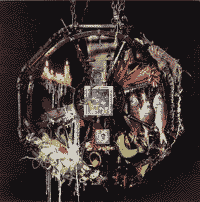
THE CONGOS
HEART OF THE CONGOS (Blood & Fire 1996 BAF CD009 also on vinyl)
Jamaican music has been around our ears long enough to have its own hagiography. Among the canon we find prophets (Bob Marley) & martyrs (Peter Tosh), and a full complement of holymen and madmen. Certainly among the latter is one of the most compelling figures in the whole recorded history of the music: the genius Lee Perry. Beginning as a flunkey at Coxsone Dodd's Studio One, he rose to prominence at his own Black Ark studio where he perfected his chops in the style known as dub music where vocal tracks were remixed with heavy effects including reverb, delay, drop-out, and fortuitous accidents caused during the mixing, which was always done "hot," that is to say with several tracks running through the board. Perry would treat some parts and mix bits of others in and out with an uncanny sense of when an interesting juxtaposition of haunting echoey bass might benefit from some ghostly vocals bouncing off the heavens. The added sacrament of ganja made these tracks take on revelatory overtones for the listener unparalleled since the Apocalypse of St John in his Greek cave.
The album often considered the crucial Black Ark production is THE HEART OF THE CONGOS which has been released in several (truncated as it turns out) versions over the years. While other producers were turning to New Orleans and Detroit for inspiration, there was an Afrocentric movement which centred around nyabinghi drumming, thought by Jamaican devotees to be a connection to their ancestral roots in Ethiopia. Thematically this holds the album together, in the sense that it is pure roots music, grounded in the Rastafarian tradition. The fine house band at the Black Ark, known as the Upsetters, were accomplished musicians quite content to have their work radically worked over by Perry. Some of their contributions are only dimly discernible under the sonic layers. But the songs come through loud and clear with the vocals soaring, no matter what is smoldering underneath. The Congos vocalists -- Cedric Myton and Roy Johnson -- attained a finely balanced harmony; in addition, Perry drafted members of the Heptones, the Meditations, Watty Burnett, and Gregory Isaacs to blend their voices for backup singing.
Extended mixes plus two tracks by the group from the Upsetter box set (not included on the original album) are included. Along with three other alternate mixes of songs, there are two extended mixes of the title song, including a drum and chant instrumental featuring Skully & Sticky. This album, recorded in 1976, is one of the great monuments of Jamaican music, standing alongside Bob Marley's NATTY DREAD, Max Romeo's WAR INA BABYLON, The Ethiopian's OPEN THE GATE, Carlton & the Shoes LOVE ME FOREVER, Wailing Soul's SOUL & POWER, and Linton Kwesi Johnson's DREAD BEAT AND BLOOD. It is to Blood & Fire's lasting credit that they have done such a masterful job of restoring the tapes and giving us a clean audition of this wonderful roots reggae as never heard before.
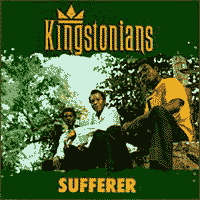
KINGSTONIANS
SUFFERER (ATLP 114)
A welcome reissue of a Trojan classic from 1970. Originally recorded by Derrick Harriott, this album includes the massive hits "Singer Man" and the bubbly "Sufferer," along with the catchy early reggae cut "Winey Winey," but the rest of the material is gold too. In fact there's not a slack track on the front or the back. The albums is alive with cuts like "Your Love," and "Nice Nice." The charmingly dated "Come we go Moonwalk" skanks us back to less-fraught times and is already back on the reggae dance hall charts.
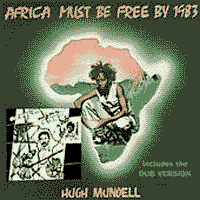
HUGH MUNDELL
AFRICA MUST BE FREE BY 1983 (RAS Records ras3201)
One of the most crucial roots rasta recordings first appeared in 1978. These sessions were recorded over time in a variety of places including Channel 1, Joe Gibbs, Harry J, and Lee Perry's Black Ark Studios, yet there is a consistency to the music which flows together like a suite. In fact some of the tunes seem to echo one another. Mundell wrote this album with help from Augustus Pablo and also gives up two tracks to a younger vocalist Jah Levi (I say he's younger, because he has a more boyish voice, but Mundell can't have been far out of his teens when this was cut). Drums are principally played by Santa Smith with the ubiquitous Robbie Shakespear on bass. Clayton Downie and Geoffrey Chung play rhythm guitars and Earl Chinna Smith plays lead guitar. Augustus Pablo plays piano and organ as does Pablo Black on the Dub sides. And to top it off there is a smattering of trombone provided by Leroy Horsemouth Wallace. The concept was a great one and seemed realistic at the time, but of course oil in Nigeria, Sudan and Angola, copper and other precious metals in Congo, etc, made sure the colonialists hung around. The songs coast along in the usual Rastafarian haze, but it's a quality blue haze. The RAS record puts both original albums back-to-back. I thought perhaps interleaving the dubs with their songs would be a good move, but no, RAS were right, as in fact the first album starts to dub itself at the end and the momentum is definitely preserved by having all the songs together then unleashing the dubbity-dubba-dub-dubbbs. The strongest songs are the opening cut, "Let's all unite" and the title cut. The dub album puts these back-to-back to wicked effect. As you know, Augustus Pablo was best known as a melodica player and his piano leads are simple and elegant. Benbow, Jacob Miller and Horsemouth also add percussion on the dub sides, and the Studio One bassist & Heptones lead singer Leroy Sibbles chimes in too. A quality product.